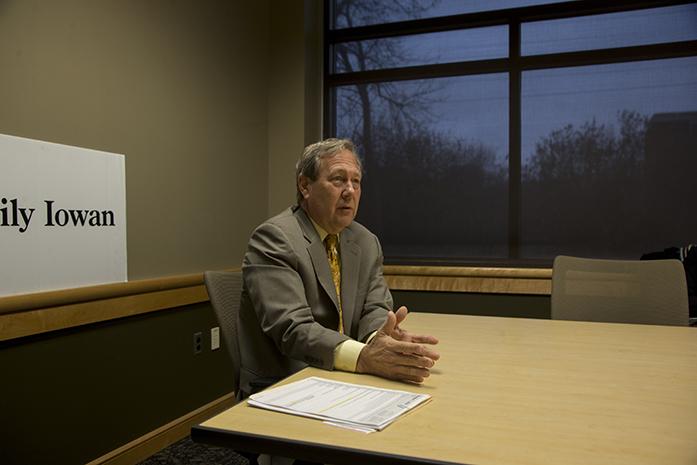Senator takes aim at university tenure
January 25, 2017
As university faculty members grapple with the reality of budget cuts passed by the Iowa Legislature, concerns regarding protection of academic freedom also weigh on their minds.
Sen. Brad Zaun, R-Urbandale, introduced a bill earlier this month in the Iowa Legislature affecting institutions governed by the state Board of Regents, prohibiting the “establishment of a tenure system at the regents universities.”
The legislation was discussed at Tuesday’s University of Iowa Faculty Council in executive session. Faculty Senate President Tom Vaughn said this allowed faculty members to openly discuss how to address the bill.
At the regents’ transparency hearing earlier this month, UI English professor Loren Glass and chair of the Iowa chapter of the American Association of University Professors membership committee said the legislation does not only affect faculty, and that he supported the regents for voicing opposition to the bill.
“This would in effect destroy the quality and value of public higher education in the state of Iowa,” he said.
Zaun proposed the legislation to prevent “bad professors” from being protected from termination, he told the Des Moines Register.
“I think the university should have the flexibility to hire and fire professors and then I don’t think that bad professors should have a lifetime position guaranteed at colleges,” he told the Register. “It is as simple as that.”
UI President Bruce Harreld voiced support for tenure systems, the core purpose of which he said is in “supporting and safeguarding” academic freedom, in an emailed statement to faculty.
“…The academic freedom that comes with tenure involves significant responsibilities and obligations to the truth and to those in our charge as we teach, research, provide care, and create,” he said. “That is why our tenure review process is so rigorous and why I support it—it attests to our expectation of the highest-quality work and a trajectory of excellence for our faculty.”
Under Zaun’s proposed legislation, “acceptable grounds for termination” include but are not limited to “just cause, program discontinuance, and financial exigency.” The academic institutions are also directed to “adopt a written statement enumerating employment agreements, annual performance evaluations of all faculty members, minimum standards of good practice, standards for review and discipline of faculty members, and policies with regard to dismissal …”
Currently, the UI has established an annual performance review of tenured faculty members in section III-10.7 of the operations manual. These reviews include “an evaluation of research/scholarship, teaching, and service.” If the unit head conducting the review finds there are “deficiencies related to teaching, research, or service,” these findings will be shared with the faculty member in question.
Additionally, tenured UI faculty members undergo a peer review once every five years. The operations manual states if “the faculty member’s performance has fallen for a significant period of time below the expected standard of performance for the faculty member’s unit,” the dean may discuss with the faculty member “a plan to address the problems uncovered in the review.”
Zaun did not respond to The Daily Iowan’s requests for a comment at the time of publication.
Changes to tenure systems have been a concern in higher education nationally, particular in the states of Missouri, where a similar bill prohibiting tenure was introduced, and Wisconsin.
Universities in Wisconsin have been undergoing changes in their tenure systems in the last year or so, with tenure being eliminated from state statute, said David Vanness, an associate professor at University of Wisconsin – Madison and former president of its American Association of University Professors chapter. He said this left universities to develop their own weakened tenure policies, which he described as “a reversal of decades of practice of shared governance at the university.”
“We believe [Wisconsin’s Board of Regents] did it because they were put under political pressure by our governor to do so,” he said. “They were not upholding the interests of the university as a whole. They were not advocating strong enough for a comprehensive, broad educational mission.”
Vanness said faculty members have been leaving at an “accelerated rate” and there has been difficulty recruiting new talent, which he said has in turn cost his university two years’ worth of recruitment and retention money.
RELATED: Senate slashes university funding
Iowa is facing its own fiscal concerns as a state. The Iowa Legislature agreed to cut funding for regent universities by $18 million, and budget problems have added to the uncertainty some feel about the effects of eliminating tenure systems.
“University of Wisconsin is one of the premier universities in the country,” said Sen. Hermann Quirmbach, D-Ames, a ranking member of the Senate education committee. “They’ve already started to fall. I hope we don’t make the same mistakes.”



